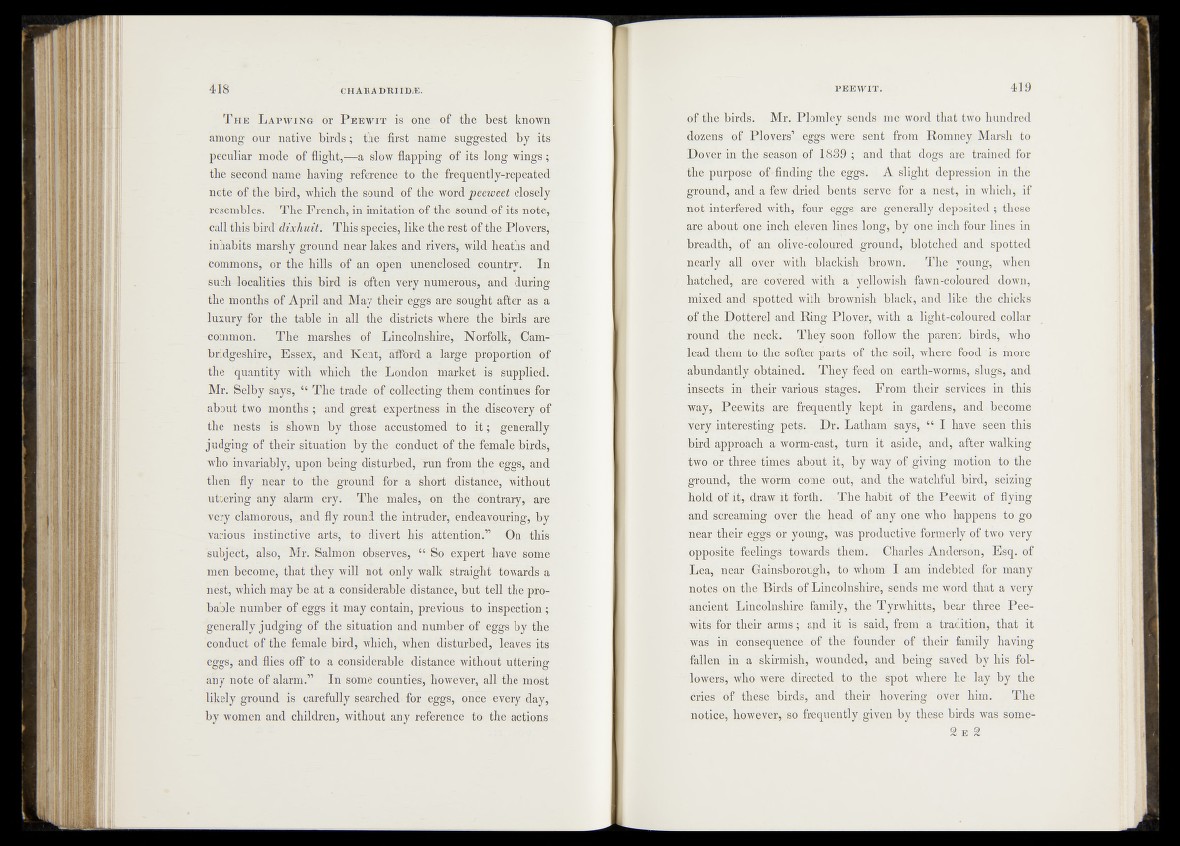
T he Lapwing7 or P eewit is' one of the -besttlinöwn
among our native birds; 'the- -first -name suggested by its
peculiar mode of flight,—a slow flapping of its long wings;
the second name having reference to the' frequently-repeated
note of the bird, which the sound of the word peeweet closely
resemble? The French, iiï imitation of the söuiid of its note,
call this bird dixhuit. Thisjspecies, like the rest of the Plovers,
inhabits marshy ground Rear lakes and rivers,_ wild heaths and
commons; or the hills of an open unenclosed ’country. In
such-localities this bird is often very numefOpS;' and during
the months of April and May their eggs are sought after' as a
luxury for the table in all thè districts where the birds are
common. The marshes of- Lincolnshire, Norfolk-,■ Cambridgeshire,
Essex, and Kenti ‘ afford a large proportion $Sf
the quantity with which the~London market is’ supplied.
Mr. Selby £ays,"“ The trade of collecting themhontinues for
about two months; and great expertness in the discover) ol‘
the nests ’ is shown by those ^accustomed to it ^-generally
judging of their situation by the -conduct* of the female birds,
whb invariably, upon being disturbed, Tun from thé^ggsE^and
then fly near to the ground for a short distance, without
uttering any alarm cry; The males?- on thé 'nêntrary, are
very clamorous, „ and fly round the intruder, endeavouring, by
various instinctive arts, to- divert his attention.”/' »On this
subject, also, Mr. Salmon observes, “ So e x p e rt-h a ^ some
men.become, that they will not only walk straight towards a
nest, which may be. at a considerable distance, but tell the probable
number of eggs it may contain, previous to inspection;
generally judging óf thé situation and number of eggs by the
conduct of the femalehird, which, whën disturbed,' leaves its
eggs, and flies off to a considerable distance without uttering
any note of alarm.” In some counties, however, all the most
likely ground is carefully searched- for eggs, once -every day,
by women and children, without any reference tb the actions
jofetke birds. Mr. Plq^ley binds me word that two hundred
'Mfz&p^^q^Plbvej^^ieggs^ were sehb from’ Romney Marsh to
Dove^in the^^^|E)^|C!;1^ 9^;s''and that dogs are trained for
the pw|)®sb‘<;ofi'finding'.,.theJ eggs--i A{<sbght depression in the
- g r o u n d , f e Mld i^ # ,beiA b ^ ^ j ' for a nest, in which, if
noMMerferfdi with. aye/generally deposited ; these
are abontloiiir&fibgbfelfeveui Mnies^ho®g|iby?db& inch foqr lines in
breadth, ©ffan oliv^^^ ^ l^ f e lS im d. ^ ^ ^M ; .::and .spotted
nearly all ioMcr.. with blac-lish * b rp .'^ iy , The feung,- when
lnitcbtid'^a^^eo?ffjfeed'a,'\ith ai )bllr®||iish fawn-coloured doiwn,
Nmixed^and®iotMd»^itK. like'gMe'n chicks
of tbejjfiptf-erel and Ring Plioyojf, ’^a%hf a lig^^»ured?.collar
-rbundl-Ae^A^ A They IbllioteAei Parent thirds, who
%ad tbeJ&tejAhe-^(^ter. spurts- oi^the/soil, -whe^ food
abUndgaatly^l^^^pSiA -Theyff|j||| o ^ea^h^orms^ -slugs, and
»insects in- their yariaUS/stages; 'From •services in this
way, ^ |^ l t s |& M 'f ^ ju .;ently kebb in g a rd ^ s^ an d - become
Very> interesting qfftyv* Dr. Latham :rsjg ^ -“ I have? "seen this
bind apprgkeh a worm-east,/tbi^if'lasi^^;"&d;: after walking
■two.'or three timeMfbbUtfcpi&b v way^^^lfi^gfimbtion'lto the
grouMd;: fh%wOrkp com'e^ou$|‘* andH1||efw£tcMul bird, seizing
bold »ofj'Mdraw it forth/ |&|||hi habit of the PeeWit/of flying
and screaming,- over the bead of- any ,pj|^who happens to go
mear their-eggs or young,- was productive formerly of4wo very
opposite feelings ‘towards• .thena^.';' Oha®les Andersinf Esq. of
Lea, near^Dainsfeorhttgh; to whom I am »indebted Tor many
no;tes. on the Birds of LincolnsMr^jsefids me word that a very
ancient Lincolnshire family, the Tyrwhitts, bear three Peewits
for their arms; a n d i s said, from a tradition, that it
was in'consequencAjof'fl%r founder of their family having
-fallen in a skirmish, wounded; and being saved by his followers,
who were- directed to the . spot; where 'h e lay by the
cries'"of these birds, and their hovering;^'over him.' The
notice, however^o frequently/given b y these birds was some-
% e %